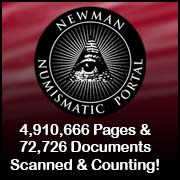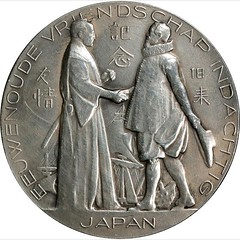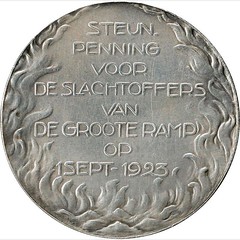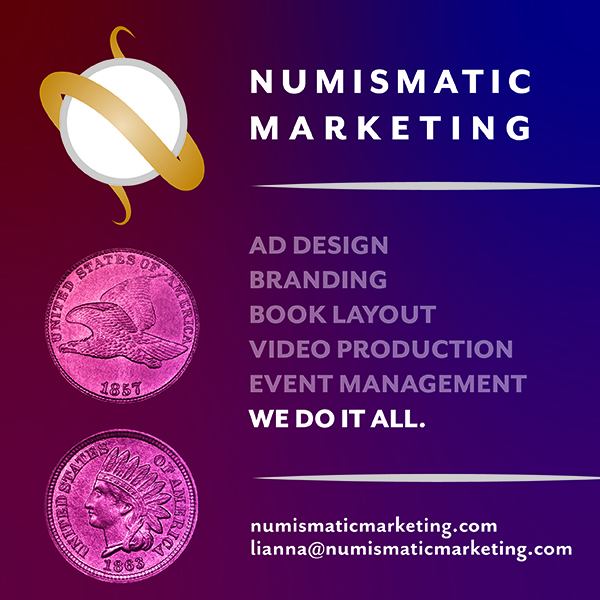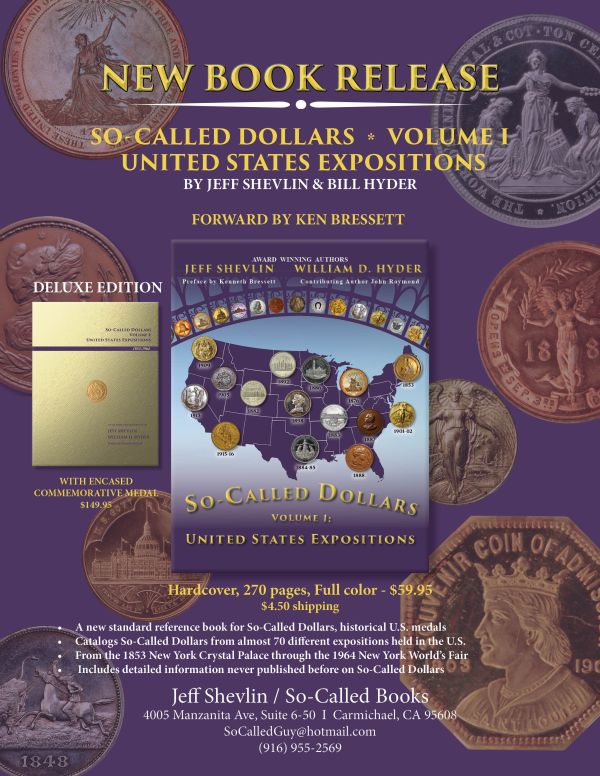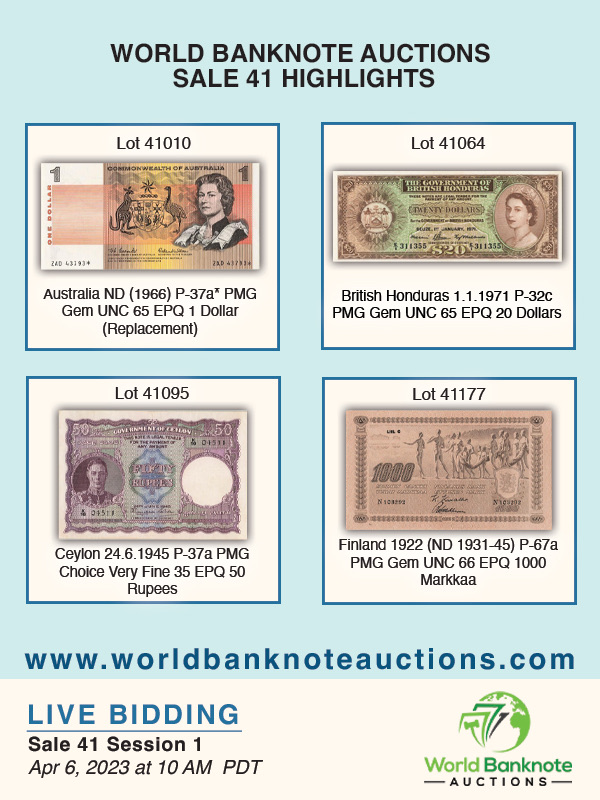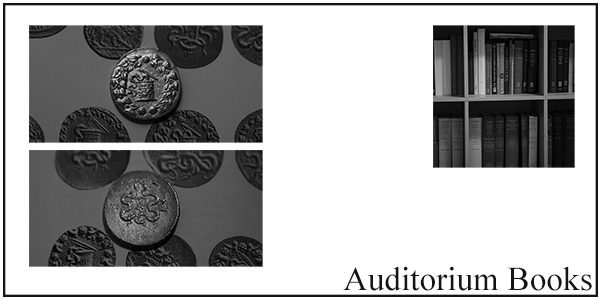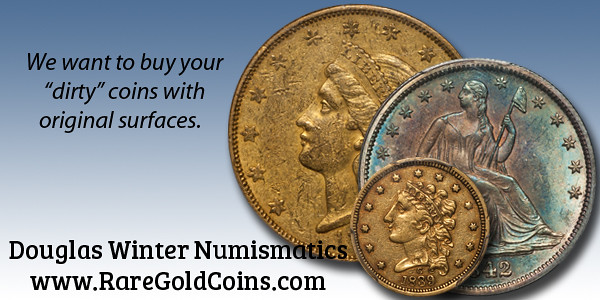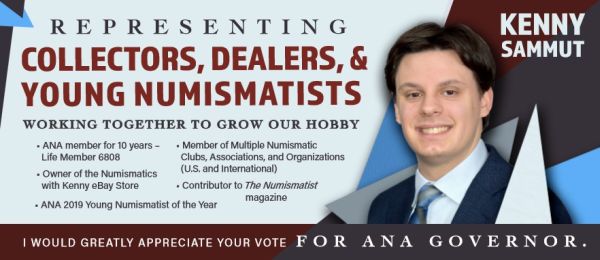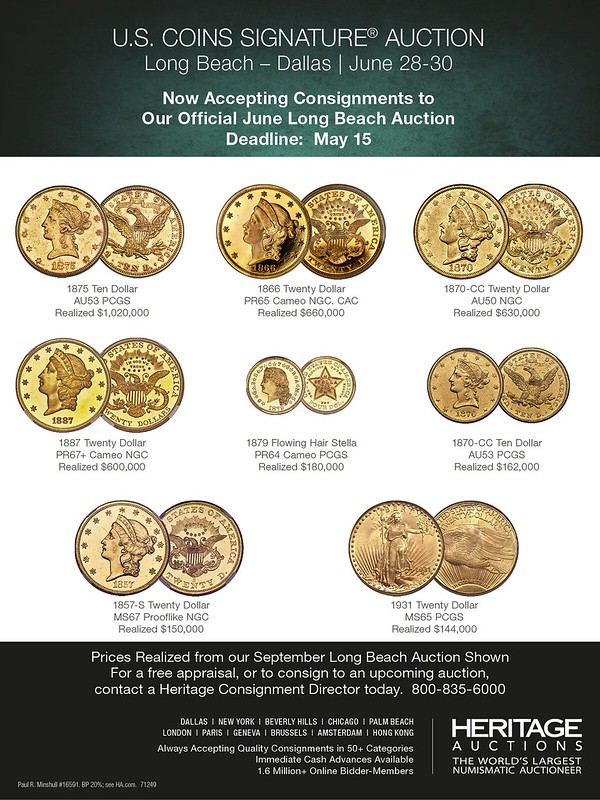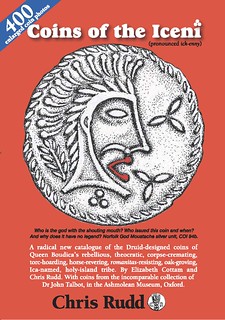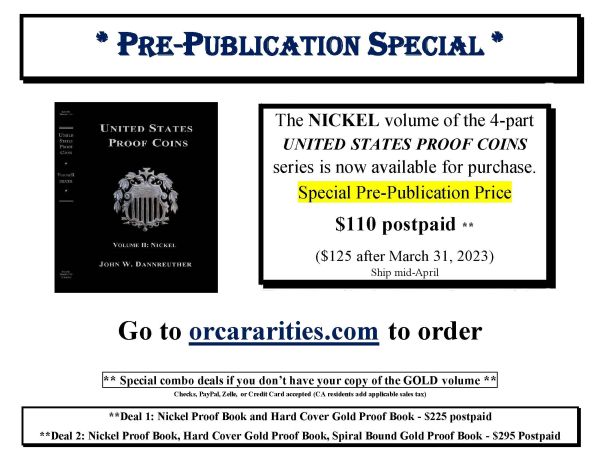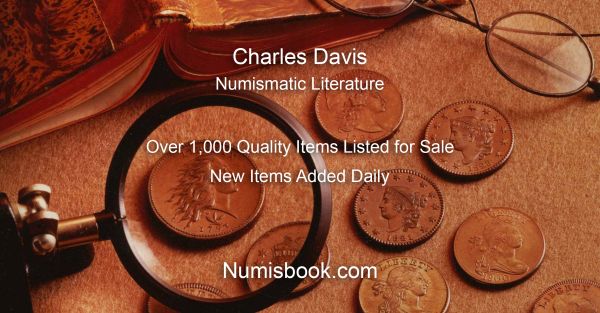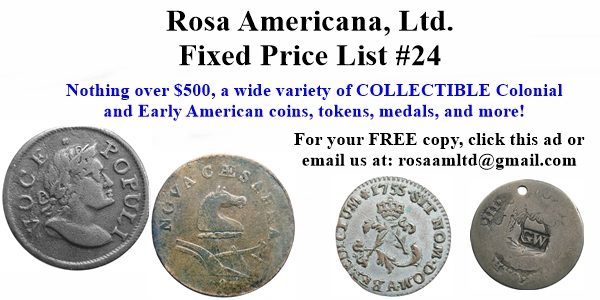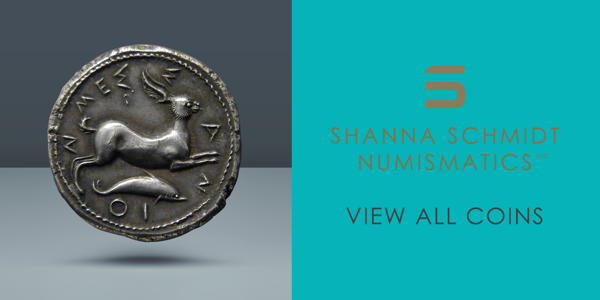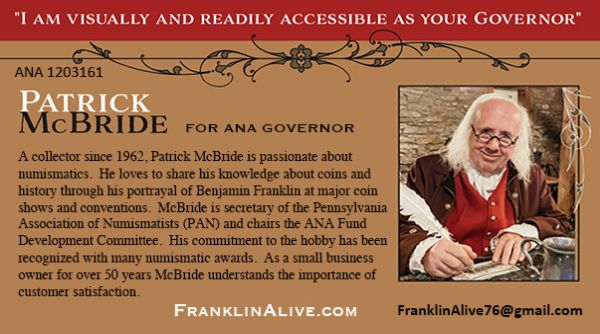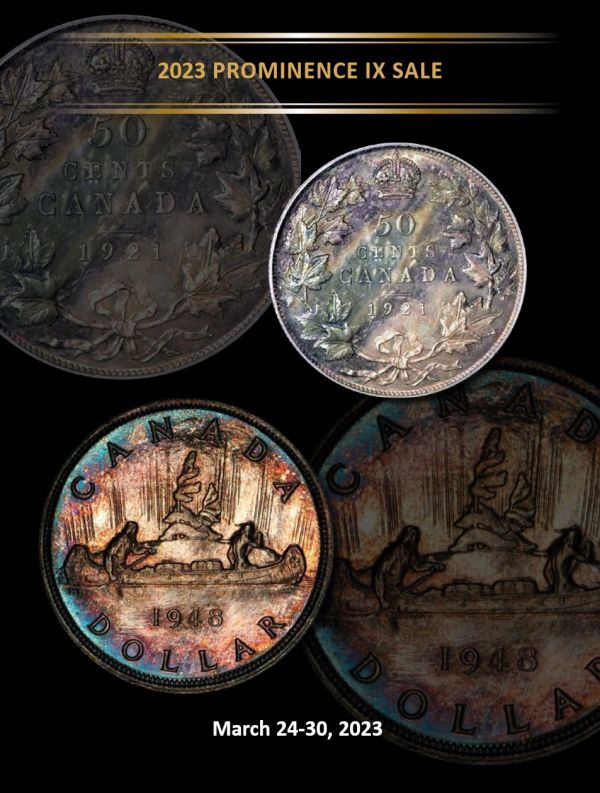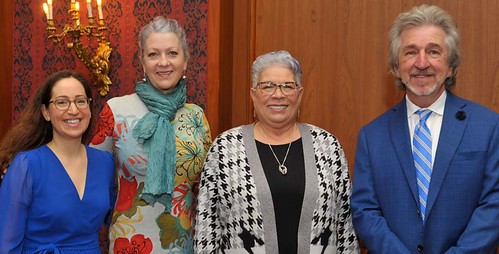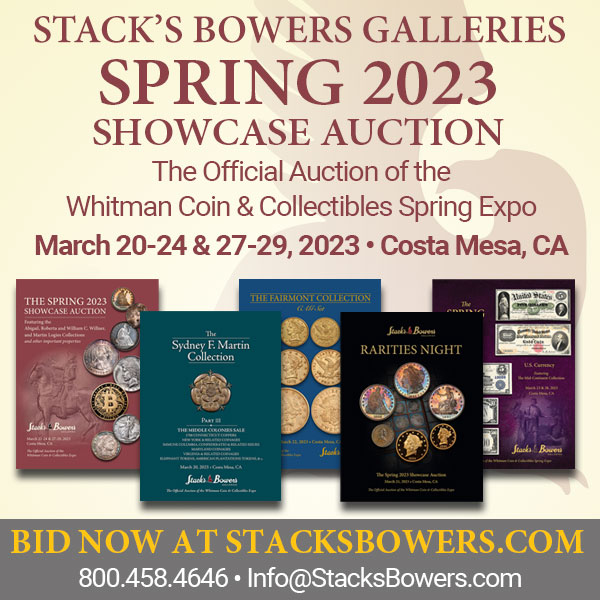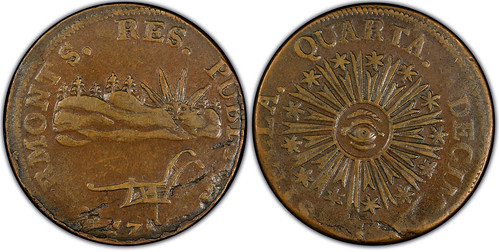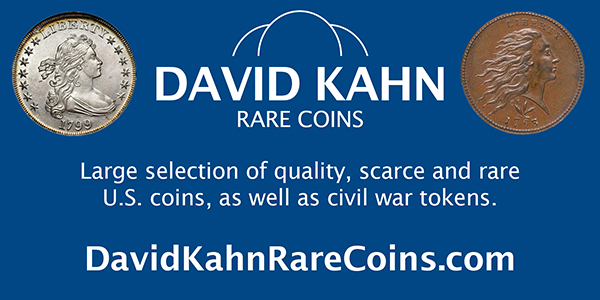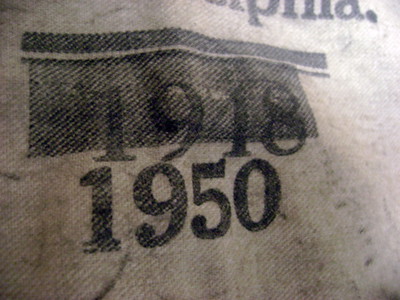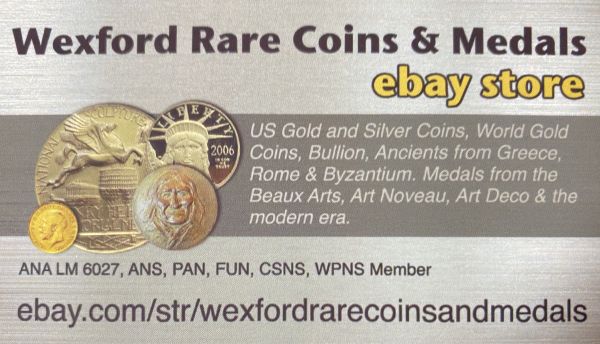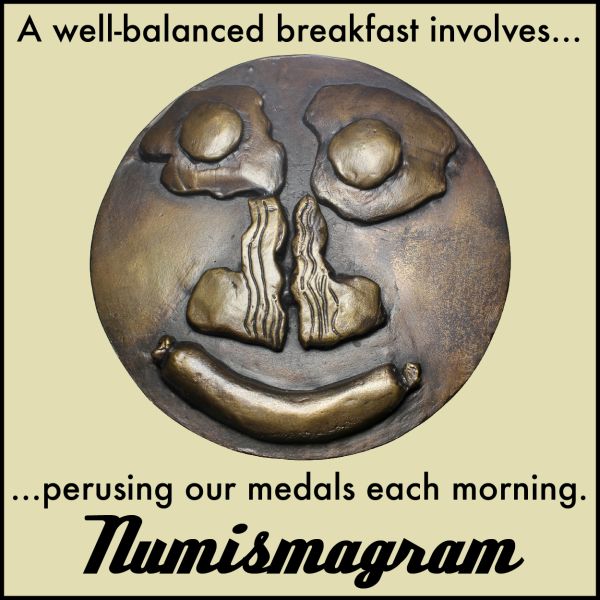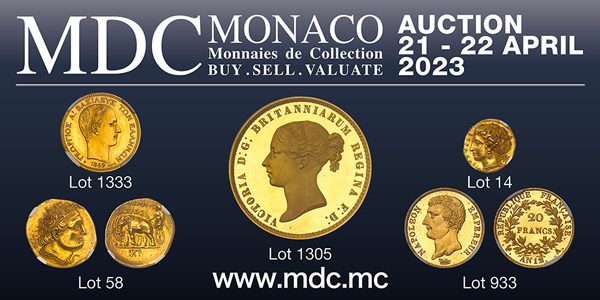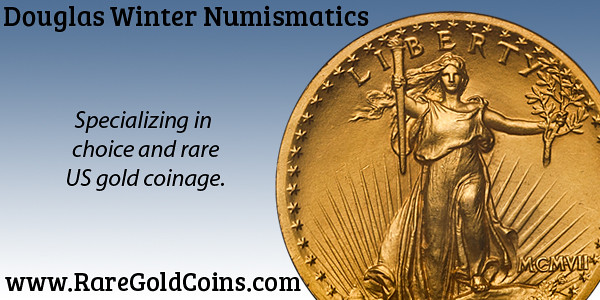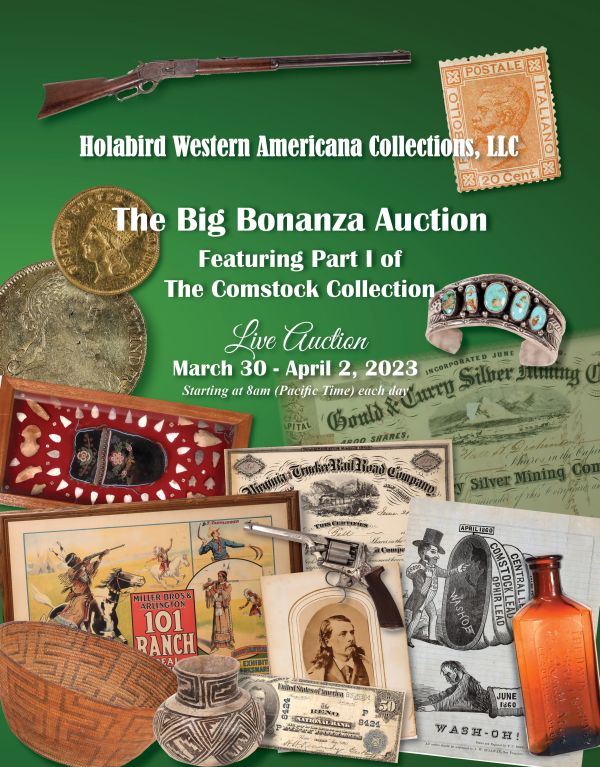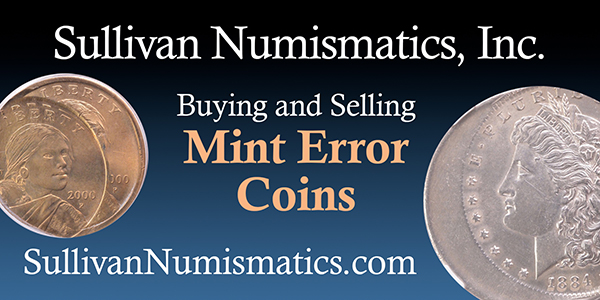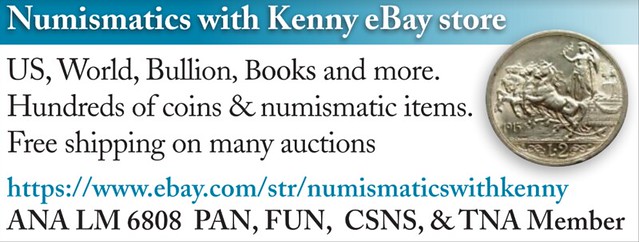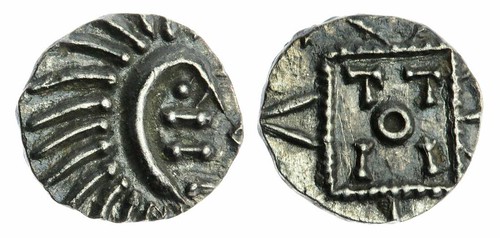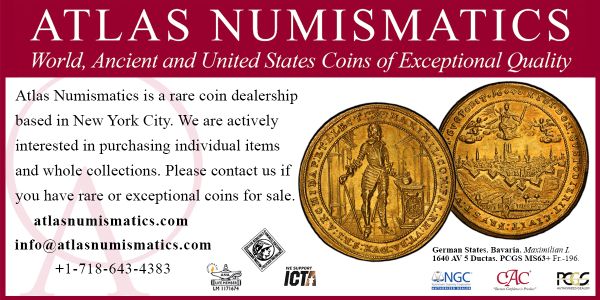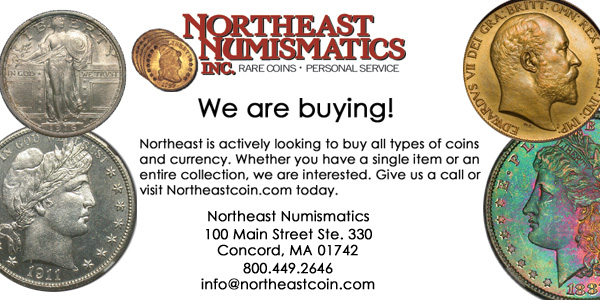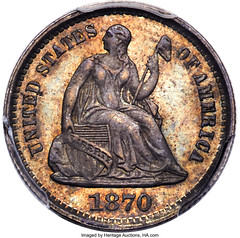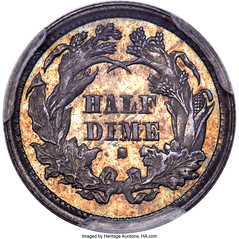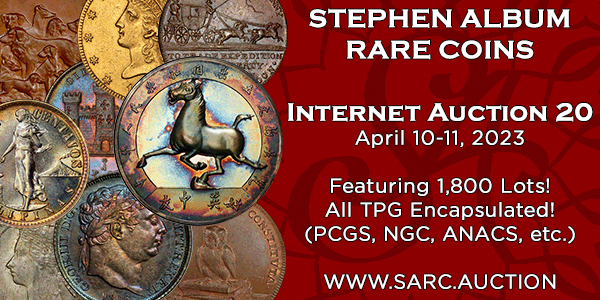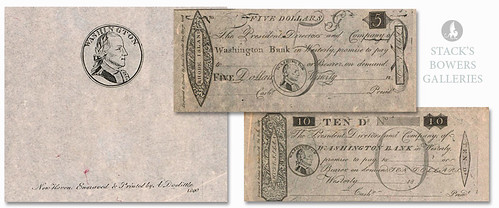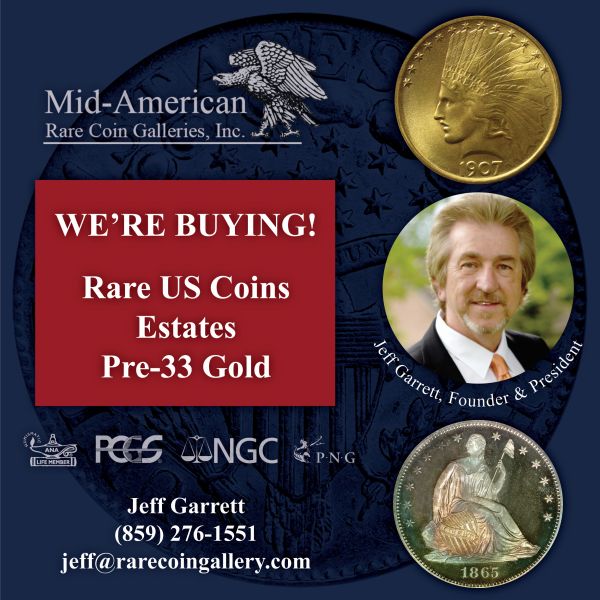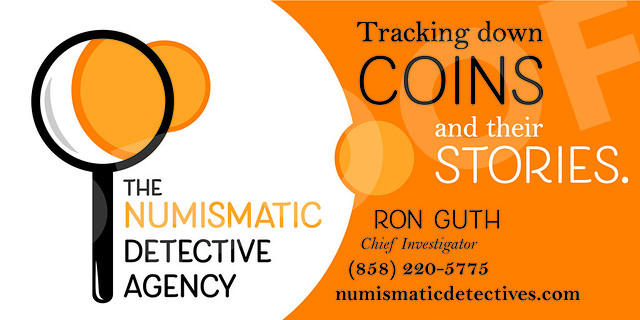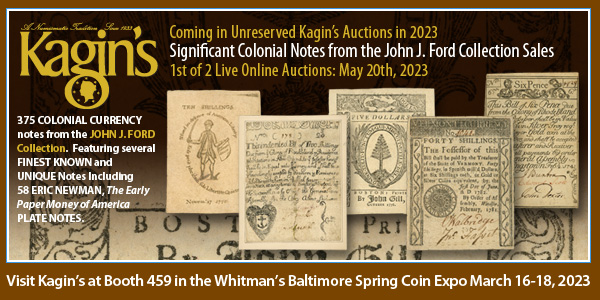
Visit our NBS Sponsors




About UsThe Numismatic Bibliomania Society is a non-profit association devoted to the study and enjoyment of numismatic literature. For more information please see our web site at coinbooks.org SubscriptionsThose wishing to become new E-Sylum subscribers (or wishing to Unsubscribe) can go to the following web page link MembershipThere is a membership application available on the web site Membership Application To join, print the application and return it with your check to the address printed on the application. Print/Digital membership is $40 to addresses in the U.S., and $60 elsewhere. A digital-only membership is available for $25. For those without web access, write to: Charles Heck, Treasurer AsylumFor Asylum mailing address changes and other membership questions, contact Chuck at this email address: treasurer@coinbooks.org SubmissionsTo submit items for publication in The E-Sylum, write to the Editor at this address: whomren@gmail.com BUY THE BOOK BEFORE THE COINSale CalendarWatch here for updates! |
- WAYNE'S WORDS: THE E-SYLUM MARCH 26, 2023
- JOHN DRURY RARE BOOKS STOCK AUCTIONED
- NEW BOOK: EASY MONEY
- NEW BOOK: SOVEREIGN OF THE MARKET
- NEW BOOK: MILITARY PAYMENT CERTIFICATES, 5TH ED.
- NEW BOOK: U.S. MINT COIN BAG GUIDE
- NEW BOOK: COINS OF THE FOURTH ABBASID PERIOD
- NEW BOOK: COINS OF THE SIKH EMPIRE
- NEW BOOK: COINS OF THE ICENI
- NEW BOOK: MONNAIES ROYALES FRANÇAISES
- NEW BOOK: THE PALESTINE CURRENCY BOARD
- NEW BOOK: TOKENS OF LOVE, LOSS AND DISRESPECT
- NEW BOOK: MEDALS AND ARTISTS
- IAPN 2023 BOOK PRIZE NOMINATIONS
- NEWMAN PORTAL ADDS U.S. MINT COIN BAG GUIDE
- SMITHSONIAN MARKS 100 YEARS OF U.S. MINT COLLECTION
- MORE ON CONFEDERATION-ERA COPPERS
- NOTES FROM E-SYLUM READERS: MARCH 26, 2023
- FEUCHTWANGER THREE CENT PIECE ORIGINS
- ROBERT COPSKEY MEDALS
- MOAF FORUM: THE INVENTION OF MODERN CURRENCY
- COAC 2023: 18TH & 19TH CENTURY DESIGN
- ANA 2023 YOUNG NUMISMATIST LITERARY AWARDS
- ANNA HYATT HUNTINGTON (1876-1973)
- NUMISMATIC NUGGETS: MARCH 26, 2023
- WAYNE'S NUMISMATIC DIARY: MARCH 26, 2023
- IDES OF MARCH COIN RETURNED TO GREECE
- DISCOVERING THE 1870-S HALF DIME
- GEORGE WASHINGTON ON EARLY PAPER MONEY
- CONFEDERATE CURRENCY COUNTERFEITER CAUGHT
- THE TWO DOLLAR BILL DOCUMENTARY
- ZIMBABWE'S LATEST SMALL CHANGE PANIC
- LOOSE CHANGE: MARCH 26, 2023
Click here to read the thin version on the web
Click here to subscribe
Click here to access the complete archive
To comment or submit articles, reply to whomren@gmail.com
Content presented in The E-Sylum is not necessarily researched or independently fact-checked, and views expressed do not necessarily represent those of the Numismatic Bibliomania Society.
WAYNE'S WORDS: THE E-SYLUM MARCH 26, 2023
 New subscribers this week include:
Pablo Morales from Guaymas, Sonora, Mexico, courtesy Adrián González-Salinas;
Daniel Baumbach, and
Jerzy Chalupski.
Welcome aboard!
New subscribers this week include:
Pablo Morales from Guaymas, Sonora, Mexico, courtesy Adrián González-Salinas;
Daniel Baumbach, and
Jerzy Chalupski.
Welcome aboard!
Thank you for reading The E-Sylum. If you enjoy it, please send me the email addresses of friends you think may enjoy it as well and I'll send them a subscription. Contact me at whomren@gmail.com anytime regarding your subscription, or questions, comments or suggestions about our content.
NOTE: Jeff Shevlin reports that anyone that orders his new So-Called Dollars Volume I book from seeing the ad in The E-Sylum will receive a FREE copy of his award-winning book "So-Called Dollars from the Pacific Coast Expositions", while supplies last.
This week we have a whopper-sized issue, driven by some colonial coin controversy and a wealth of new book information, thanks in part to our friends at IAPN. We open with a literature sale, ELEVEN new (or recent) books, the IAPN book prize nominees, an update from the Newman Numismatic Portal, and more.
Other topics this week include military payment certificates, money of the Palestine Currency Board, coin bags, Feuchtwanger three-cent tokens, the 2023 Coinage of the Americas Conference, the 1870-S Half Dime, counterfeit Confederate notes, two dollar bills, and Zimbabwe's small change panic.
To learn more about David Edmunds, the American invention of modern money, Sikh religious tokens, coins of the Iceni, the U.S. Mint Coin Cabinet, Civil War artifacts, Proof Set packaging, sculptor Anna Hyatt Huntington, Gene Hessler's smallest book, the South African & International Exposition, and the quilled porcupine, read on. Have a great week, everyone!
Wayne Homren
Editor, The E-Sylum
JOHN DRURY RARE BOOKS STOCK AUCTIONED
Patrick Parkinson alerted me to the sale of the remaining stock of the late U.K.-based rare book seller David Edmunds. Thank you. -Editor
Patrick writes:
"I recall that you have previously reported on his death. His library will be auctioned on March 30. Not sure if there is anything numismatic here. Anyone collecting British banking history would have to consider this a very important sale."
Here's an excerpt from the catalogue forward by Jenny Edmunds. -Editor
BOOKS FROM THE REMAINING STOCK OF JOHN DRURY RARE BOOKS
DAVID EDMUNDS (1939-2022)
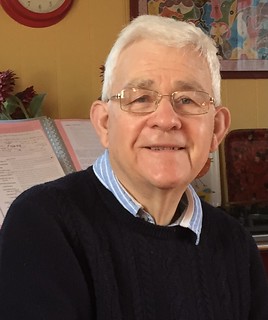 Many will already know that David tragically died in a car accident in February last year. He was on
his way to view a few items in an auction in Colchester which is what he loved to do, and which had
been his passion and working life for almost 60 years.
Many will already know that David tragically died in a car accident in February last year. He was on
his way to view a few items in an auction in Colchester which is what he loved to do, and which had
been his passion and working life for almost 60 years.
David grew up in a huge rambling rectory in a tiny village in northwest Essex where his father was the Anglican parson. There were the remains of a Roman villa in fields nearby and David and his brother spent many happy hours digging and finding hundreds of ancient coins and other artefacts. This evidently sparked a love of antiquities and in particular collecting coins and medals. He later read modern history at Jesus College, Cambridge, and his knowledge of English history was immense. His coin and medal collection grew, and with it, inevitably, his research into the collection of the required books on the subject. Thereby began acquisition of numismatic books, which before long grew into a full-time business.
David called the business John Drury Rare Books, rather than David Edmunds Rare Books (because I didn't want people turning
up at the house with their old family bibles
!), and, in any case, Drury was a family name. The first 30 or so catalogues were
mostly on numismatics, but from then on, the subject range widened into economics, banking, law, philosophy, education, and
social history. In those days there were no computers, and I would come home after a day's work in Colchester and type up (on
a typewriter) catalogues from David's handwritten notes. And he never really mastered a keyboard – his cataloguing to the end
was entirely by hand. He only used the computer to look things up
– ODNB, Wikipedia, LHD, BL, etc. It wasn't long before it
became essential for me to become properly involved and become tech-savvy. And so our roles were defined – he did the
buying, cataloguing, and packing, while I did the database work, accounts, invoicing, photography, etc.
NEW BOOK: EASY MONEY
A new book by economic historian Dror Goldberg tells the origin story of modern money through the Massachusetts colony. See the article elsewhere in this issue about an online forum with the author and a colleague sponsored by the Museum of American Finance. -Editor
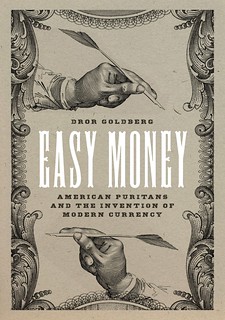 Easy Money
Easy Money
American Puritans and the Invention of Modern Currency
Dror Goldberg
A sweeping history of the American invention of modern money.
Economists endlessly debate the nature of legal tender monetary systems—coins and bills issued by a government or other authority. Yet the origins of these currencies have received little attention.
Dror Goldberg tells the story of modern money in North America through the Massachusetts colony during the seventeenth century. As the young settlement transitioned to self-governance and its economy grew, the need to formalize a smooth exchange emerged. Printing local money followed.
NEW BOOK: SOVEREIGN OF THE MARKET
On a similar topic is this 2017 book we hadn't discussed before (so it's new to us - or me, anyway). Author Jeffrey Sklansky examines the "money question" in early America. -Editor
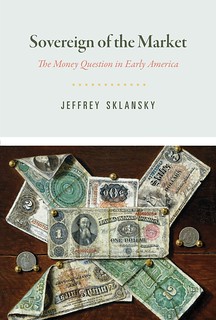 Sovereign of the Market
Sovereign of the Market
The Money Question in Early America
Jeffrey Sklansky
What should serve as money, who should control its creation and circulation, and according to what rules? For more than two hundred years, the money question
shaped American social thought, becoming a central subject of political debate and class conflict. Sovereign of the Market reveals how and why this happened.
NEW BOOK: MILITARY PAYMENT CERTIFICATES, 5TH ED.
A new edition of The Comprehensive Catalog of Military Payment Certificates has been published. Here's the announcement. -Editor
Comprehensive Catalog of Military Payment Certificates
Fifth Edition released at MPC Fest
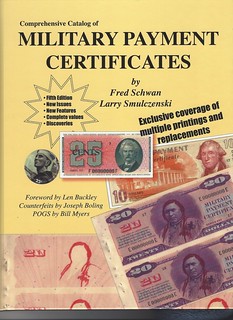 The fifth edition of The Comprehensive Catalog of Military Payment Certificates is being released within a few days of the fiftieth anniversary of the withdrawal of MPC from use in Vietnam on March 15, 1973. The military money was completely discontinued on November 19, 1973. This colorful money was first issued on September 16, 1946, and collectors immediately added examples to their collections. The first catalogs of MPC began appearing in the 1960s.
The fifth edition of The Comprehensive Catalog of Military Payment Certificates is being released within a few days of the fiftieth anniversary of the withdrawal of MPC from use in Vietnam on March 15, 1973. The military money was completely discontinued on November 19, 1973. This colorful money was first issued on September 16, 1946, and collectors immediately added examples to their collections. The first catalogs of MPC began appearing in the 1960s.
The overall reason for issuing MPC was to attempt to control the black market which flourished in Europe at the end of World War II. The introduction (September, 1946) of this new money for use by military personnel necessitated additional, often interesting to collectors, issues.
The new edition by Fred Schwan and Larry Smulczenski is very different from the early books and even other numismatic books today. This edition consists of 240 full-color pages of information, images, data and charts of interest to collectors.
NEW BOOK: U.S. MINT COIN BAG GUIDE
E-Sylum Feature Writer Pete Smith has written a new book on U.S. Mint coin bags. Here's an excerpt. -Editor
 The February 12, 2023, issue of The E-Sylum, published by Wayne Homren, included an article
on
The February 12, 2023, issue of The E-Sylum, published by Wayne Homren, included an article
on COLLECTING AND CATALOGING U.S. MINT BAGS.
In his comments following the article,
Wayne wrote, This is the fun and challenge of collecting numismatic ephemera. These artifacts
served a purpose in their time, and most were later discarded after their useful life. The few
that remain are interesting souvenirs and collectibles. Who will be the David Lange of mint
bags? It would be interesting to catalog these and learn more about what exists.
I agreed that it would be interesting to catalog these and learn more about what exists. And so I
began. I wrote AN ESSAY ON COIN BAGS
that was published the following week on February
19. Again, editor Homren had comments. As I noted last week, coin bags are interesting
souvenirs and collectibles, and a project to photograph and catalog them would be welcome.
Wayne had just told me that I needed to gather photographs so I began to harvest what I could find on the Internet. A week into the project I realized that my list of bags and file of pictures needed to be integrated into a book format.
NEW BOOK: COINS OF THE FOURTH ABBASID PERIOD
SPINK has published a new book by Yahya Jafar on the coins of the Fourth Abbasid Period. It has been nominated for the IAPN book prize. -Editor
The coins of the Fourth Abbasid Period And some history (552-656h/1136-1258AD)
by Yahya Jafar
Regular price £100.00
THE BOOK BAZARRE
Bowers Serieswas written by award-winning author Joshua McMorrow-Hernandez, who presents these silver coins to both collectors and investors. 384 pages. Order your copy online at Whitman.com , or call 1-800-546-2995.
NEW BOOK: COINS OF THE SIKH EMPIRE
SPINK has published a new book on the coins of the Sikh Empire. -Editor
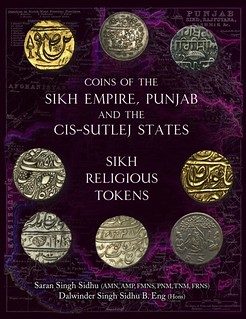 Coins of the Sikh Empire, Punjab and the Cis-Sutlej States: Sikh Religious Tokens
Coins of the Sikh Empire, Punjab and the Cis-Sutlej States: Sikh Religious Tokens
Hardback
£75
Colour Illustrations
566 pp
This book introduces the rich heritage of the Sikhs in Punjab through coins and tokens. From the very first known coins issued by Baba Banda Singh Bahadur in 1711, to the last Sikh Coins issued by Maharaja Duleep Singh in early 1849, one can follow the rise and fall of the Sikh Empire. Gold Mohurs, silver Rupees and copper Paisa are well documented, with numerous unlisted types and varities.
NEW BOOK: COINS OF THE ICENI
A new book by Chris Rudd catalogues the Celtic coins of Norfolk. Also nominated for the IAPN Book Prize. -Editor
COINS OF THE ICENI
New book from Chris Rudd - Published February 2022
‘Now coins of the Iceni are easier to identify, easier to understand'
- 400 enlarged photos, mainly of coins from the incomparable collection of Dr John Talbot in the Ashmolean Museum, Oxford
- 60 colour illustrations and maps
- two-way ABC-COI concordances
- index of Icenian coins by type names
- A5, 96pp, paperback, £20 post free
- 978-0-9566889-5-8
Coins of the Iceni is a radical new catalogue of the Druid-designed coins of Queen Boudica's rebellious, theocratic, corpse-cremating, torc-hoarding, horse-revering, romanitas-resisting, oak-groving, Ica named, holy-island tribe. It is the most convenient, most comprehensive catalogue of the Celtic coins of Norfolk c.55 BC-AD 47. It makes them simpler to identify, simpler to classify. It names, describes, illustrates, dates and ‘rarefies' 250 Icenian coin types, sub-types and variants; more than twice as many as in Ancient British Coins. It also links them to the Druids and to 3,000 years of Norfolk's sacred prehistory. Coins of the Iceni has 96 pages, 400 enlarged photos, mainly of coins from the incomparable collection of Dr John Talbot in the Ashmolean Museum. Oxford, 60 colour illustrations and maps, two way ABC-COI concordances, index of Icenian coins by type names.
NEW BOOK: MONNAIES ROYALES FRANÇAISES
Here's a Google-translated description of a new book by S. Sombart on the French Royal coinage from Louis XI to Henri IV. -Editor
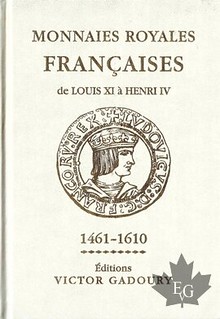 Monnaies Royales de Louis XI à Henri IV
Monnaies Royales de Louis XI à Henri IV
Author: S. Sombart
Publisher: Editions V. Gadoury
Year: 2022
€ 39.00
For this new work, the traditional method of classification of the Gadoury editions is respected: the coins are classified by reigns, chronologically then, within each reign, they are classified from the denomination of the smallest value to the greatest value, according to the prices of the time. The logical order of metals is respected with copper (from Henry III), billon, silver and gold.
The types are illustrated at their real size with, each time, the technical characteristics: metal and fineness in thousandths / the official weight / the diameter The rarity index is indicated in the type, from current "C" to "R5" , passing through R (= R1), R2, R3, R4. Generally, an R5 rarity index indicates a coin seen at 1 or 2 copies, R4 for 3 to 5 copies, etc.up to C for a common currency.
Only coins are quoted whose existence we have confirmed and have seen at least one example for sale. The dash "-" indicates an absence of quotation, for lack of sufficient elements to do so: number of R5 coins are for example known only in one copy.
NEW BOOK: THE PALESTINE CURRENCY BOARD
Howard Berlin has published a new book on the history and finances of the Palestine Currency Board. -Editor
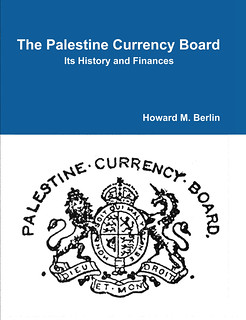 The Palestine Currency Board: Its History and Finances
The Palestine Currency Board: Its History and Finances
by Howard M. Berlin (aka The Numismatourist™)
Format: 8.5 x 11 (216 x 297 mm), full color, paperback and hardcover 291 pages, 72 tables, 52 pictures, 453 footnotes.
Paperback Edition
ISBN: 978-1-329-86836-6
Price: $40.95
Hardcover Edition
ISBN: 978-1-312-80877-5
Price: $57.95
Listed prices do not include shipping charges, if applicable.
NEW BOOK: TOKENS OF LOVE, LOSS AND DISRESPECT
A new IAPN-nominated book edited by Sarah Lloyd examines the history of defaced coins and tokens. -Editor
Tokens of Love, Loss and Disrespect 1700-1850
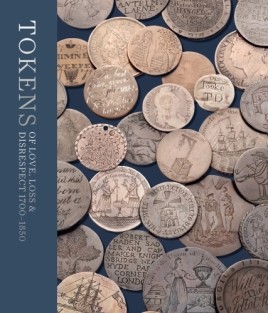 Publication date: January 2023
Publication date: January 2023
Publisher : Paul Holberton Publishing
Editor : Sarah Lloyd
Language: English
Illustration : 250
Format Available : Paperback
ISBN : 9781911300946
Dimensions : 240 X 170 mm
Price : £45.00
Coins from the 18th and early 19th centuries are physically and visually intriguing. In addition to their monetary uses, they were repurposed to communicate private and public messages - from ad hoc scratchings and punch marks to full-scale re-engraving of surfaces. This book aims to give 21st-century readers insight into that experience and to the many uno?cial purposes these objects served.
NEW BOOK: MEDALS AND ARTISTS
Here's a Google-translated description of a new IAPN-nominated book on the medals of Swedish artists Carl Eldh, Eric Grate, Bror Hjorth, Carl Milles and Bruno Liljefors. -Editor
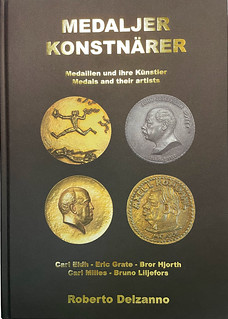 Medaljer konstnärer (Medals and artists)
Medaljer konstnärer (Medals and artists)
- A different book
- 414 pages
- Color
- A4 - Hardcover
- Nominated for best numismatic book in the world by IAPN!
- SEK 650
The book describes Carl Eldh, Eric Grate, Bror Hjorth, Carl Milles and Bruno Liljefors' entire medal issue, their medal art and the circumstances surrounding the actual issue and use of the medals. For the first time ever, a coherent picture of these artists is given. Each artist's medal production has been systematically documented, where the National Archives and the Royal Library with its newspaper archive have added significant and, for our time, partly previously completely unknown knowledge. Many previous question marks and uncertainties are now finally investigated and clarified. Biographies, contemporary descriptions, delicious illustrations and lots of enlargements and detailed pictures fill the book from cover to cover. The book is of course trilingual (Swedish, German, English), fully in color, A4, 421 pages.
IAPN 2023 BOOK PRIZE NOMINATIONS
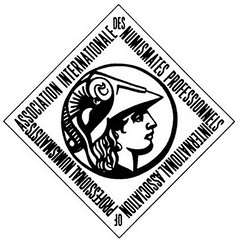
The International Association of Professional Numismatists (IAPN) awards an annual book prize. Organizer Peter Preston-Morley kindly forwarded the list of this year's nominees. There are 22 nominations this year. The Prize will be decided at the IAPN General Assembly in Marseille, France, on 4 June 2023. -Editor
NEWMAN PORTAL ADDS U.S. MINT COIN BAG GUIDE
The latest addition to the Newman Numismatic Portal is a book on U.S. Mint coin bags by Pete Smith. NNP Project Coordinator Len Augsburger provided the following report. -Editor
Pete Smith Writes U.S. Mint Coin Bag Guide
 While most of us have seen a U.S. Mint coin bag here or there, no one has attempted a wider treatment of the subject, until now. Pete Smith's The Incomplete Guide to United States Mint Coin Bags (92 pp.) represents the first best attempt to restore order to the chaos of cloth banks utilized by the various Mints. Using online sources, as well as his own experience in the bullion trading business, Smith identifies the major categories of bags and creates a framework for collectors and future researchers.
While most of us have seen a U.S. Mint coin bag here or there, no one has attempted a wider treatment of the subject, until now. Pete Smith's The Incomplete Guide to United States Mint Coin Bags (92 pp.) represents the first best attempt to restore order to the chaos of cloth banks utilized by the various Mints. Using online sources, as well as his own experience in the bullion trading business, Smith identifies the major categories of bags and creates a framework for collectors and future researchers.
Bags surely existed in massive quantities but are infrequently seen today. Smith notes that 56,470 bags would have been required for the 1940-S cent coinage and by extension asks, where are they now?
Today, the most prized bags are those used to transport gold or Carson City coinage, and nearly all bags identified date to the 20th century.
SMITHSONIAN MARKS 100 YEARS OF U.S. MINT COLLECTION
This CDN Publishing article has a montage of images from a recent event at the Smithsonian celebrating the centennial of the incorporation of the U.S. Mint Coin Cabinet into the National Numismatic Collection. -Editor
The transfer of the Mint Coin Cabinet a century ago transformed the NNC into a national and world treasure and gave it an eclectic mix of coins, medals, and alternative currencies. These objects had served as reference material for U.S. Mint officials and engravers since the Cabinet was formally established in Philadelphia in 1838. In the decades that followed and with funds appropriated by Congress, the Cabinet grew to include patterns, proofs, and uncirculated coins and medals made by the U.S. Mint itself, as well as a wide range of private issues and international coins and medals from across the globe. By the time the collection was transferred to the Smithsonian in 1923, it numbered over 18,000 objects and included many rare and unique specimen.
A century later, the U.S. Mint continues to help grow the National Numismatic Collection, by providing annual transfers of the new coins and medals it produces. The Mint Cabinet remains the centerpiece of the National Numismatic Collection and an incomparable resource for the study of U.S. coinage and its many connections to the history of money worldwide.
MORE ON CONFEDERATION-ERA COPPERS
Last week, we discussed a PCGS article redefining New Jersey, Vermont, Connecticut, and other confederation-era ‘coppers' as 'halfpennies'.
Colonial Coin Collectors Club (C4) President Chris McDowell wrote "one of the authors has already disavowed the work and requested his name be removed." When I drafted the E-Sylum piece I sent a copy to all of the listed authors and one of them (Jeff Rock) confirmed to me that he'd asked PCGS to remove his name. Later the lead author Craig Sholley shared email messages confirming that all listed authors had earlier been contacted. However, over a year had passed since then. Here are comments on the topic submitted by Jeff and others. -Editor
NOTES FROM E-SYLUM READERS: MARCH 26, 2023
On That 1950 Overdated Mint Bag
Bern Nagengast writes:
"I took a better look at the so called 1950/1918 mint bag and those who responded that it is in fact a 1950 over 1948 are correct. Here's a close up clearly showing 1948, not 1918. That would make more sense. Not a good idea for me to look too quickly at coins or mint bags!"
It had me fooled at first, too. Our readers don't miss a thing. Thanks, everyone. -Editor
To read the earlier E-Sylum articles, see:
NOTES FROM E-SYLUM READERS: MARCH 12, 2023 : Overdated U.S. Mint Bags
(https://www.coinbooks.org/v26/esylum_v26n11a14.html)
MORE ON OVERPRINTED MINT BAGS
(https://www.coinbooks.org/v26/esylum_v26n12a14.html)
Other topics this week include China Mint Long Beach Expo Pandas, Civil War Artifacts and Medals of Honor and U.S. Mint Proof Set Packaging. -Editor
FEUCHTWANGER THREE CENT PIECE ORIGINS
Researcher Roger Burdette submitted some interesting background information on the origin of Feuchtwanger's Three Cent Piece. Thank you! -Editor
Roger writes:
"I came across some interesting information regarding Feuchtwanger's Composition 3-cent tokens while researching other subjects in the Massachusetts Historical Society's John Quincy Adams Diary, volume 33: September 12, 1837. Ref. 12. IV:30. Tuesday.
"Adams had already served as President, and in 1837 was a member of the House of Representatives."
Feuchtwanger's 3-Cent Token Suggested by John Quincy Adams.
Here is the lot description from Heritage's 2023 May 22 Certified American Tokens & Medals US Coins Showcase Auction #60320,
ROBERT COPSKEY MEDALS
Jim Haas passed along this information about some of the medals of Bob Copskey of the Maryland Institute College of Art. Thanks. -Editor
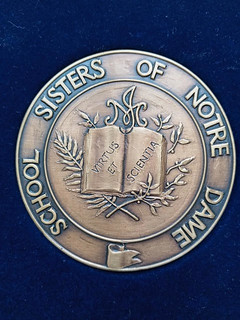 Bob Copskey has taught sculpture at the Maryland Institute College of Art for many years. Here is some information on his commissions and medallions.
Bob Copskey has taught sculpture at the Maryland Institute College of Art for many years. Here is some information on his commissions and medallions.
The School Sisters of Notre Dame commissioned him to make a 32" square bronze floor relief for the new Knott Science Building at the College of Notre Dame, Baltimore, MD in 2001. The School Sisters of Notre Dame also commissioned him to make a medallion using the same design. He sold them the rights to strike medallions in the future. Bedi-Makky in Brooklyn, NY cast the bronze floor relief, and the Jenkins Company in Baltimore struck the medallions.
MOAF FORUM: THE INVENTION OF MODERN CURRENCY
The Museum of American Finance is sponsoring a free online forum on the topic of "American Puritans and the Invention of Modern Currency." -Editor
MoAF/Fordham Financial Issues Forum (VIRTUAL EVENT)
Dror Goldberg, in Conversation with Richard Sylla, on Easy Money: American Puritans and the Invention of Modern Currency
Thursday, April 27, 2023 | 12:00 PM to 1:00 PM
COAC 2023: 18TH & 19TH CENTURY DESIGN
The ANS 2023 Coinage of the Americas Conference theme is 18th & 19th Century Design and Production. Here's the call for papers. Please consider participating. -Editor
Coinage of the Americas Conference 2023: 18th & 19th Century Design and Production
Generously sponsored by the Resolute Americana Collection and the Stack Family
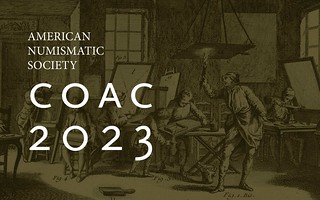 American Numismatic Society (ANS)
American Numismatic Society (ANS)
New York, New York
Conference: September 22–23, 2023
Submission Deadline: June 1, 2023
Email submissions and questions to Dr. Jesse Kraft, ANS Resolute Americana Assistant Curator of American Numismatics at jkraft@numismatics.org.
The American Numismatic Society (ANS) is proud to announce the 2023 Coinage of the Americas Conference (COAC). Since the mid-1980s, COACs are considered the leading venue for the presentation of academic research pertaining to numismatics of the Western Hemisphere. Papers presented at COACs have routinely been published, resulting in a number of edited volumes that have become standard reference texts on their respective topics.
ANA 2023 YOUNG NUMISMATIST LITERARY AWARDS
Coming up April first is the deadline for submissions to the ANA Young Numismatist Literary Awards. -Editor
Submissions Accepted for ANA Young Numismatist Literary Awards
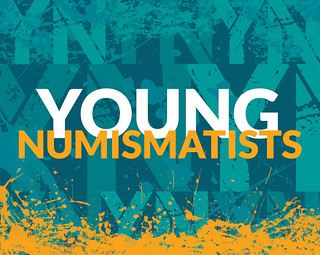 Submissions for the American Numismatic Association's (ANA) annual Young Numismatist Literary Awards competition are being accepted through April 1. The awards were established to encourage young writers in three age groups, all of whom will compete for cash awards and numismatic books.
Submissions for the American Numismatic Association's (ANA) annual Young Numismatist Literary Awards competition are being accepted through April 1. The awards were established to encourage young writers in three age groups, all of whom will compete for cash awards and numismatic books.
Article submissions will be evaluated by a panel of judges that includes Bill Fivaz, Mitch Sanders and Kenneth Bressett.
ANNA HYATT HUNTINGTON (1876-1973)
Archer M. Huntington was a major benefactor of the American Numismatic Society in New York, and served as its President from 1905 to 1910. E-Sylum Feature Writer and American Numismatic Biographies author Pete Smith submitted this additional background article illustrating Huntington's family and wealth. Thanks! Great history. -Editor
In past weeks we have discussed the mother and first wife of Archer Milton Huntington. He was left in a dark depression after his divorce from Helen. He was a tall man at six-foot-five-inches. During this time his weight grew to 350 pounds. His second wife brought him out of his depression.
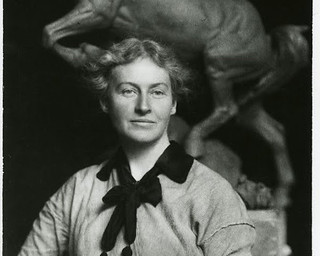 Anna Vaughn Hyatt was born in Cambridge, Massachusetts, on March 10. 1876. Her father was
Alpheus Hyatt Jr. (1838-1902), a professor of paleontology and zoology at MIT and Harvard.
Alpheus and an older sister sparked her early interest in animals and the study of animal
anatomy. Her mother, Audella Beebe (1840-1932), was a landscape painter.
Anna Vaughn Hyatt was born in Cambridge, Massachusetts, on March 10. 1876. Her father was
Alpheus Hyatt Jr. (1838-1902), a professor of paleontology and zoology at MIT and Harvard.
Alpheus and an older sister sparked her early interest in animals and the study of animal
anatomy. Her mother, Audella Beebe (1840-1932), was a landscape painter.
Anna studied animals in zoos and the circus. Her first art teacher was Henry Hudson Kitson who dropped her as a student after she identified anatomical flaws in his work. She studied at the Art Students League under Hermon Atkins MacNeil. Later she worked with Gutzon Borglum.
NUMISMATIC NUGGETS: MARCH 26, 2023
Here's a selection of interesting or unusual items I came across in the marketplace this week. Tell us what you think of some of these. -Editor
A Quilled 'Porcupine' Sceat
Anglo-Saxon England, Continental Phase (695-740), Sceat, Series E, Variety A, quilled 'porcupine' crescent right, enclosing four bars, rev. beaded votive standard, pellet either side of central annulet, two pellets in lower section ~ 'TOTII' inscription, chevron to periphery, 0.99g, 5h (SL 94-10; SCBI 69 [Abramson], 241; Spink 790B), attractively toned with underlying lustre, a pleasingly good very fine, a desirable example of this commonly encountered type
Another interesting early British piece. From the Spink Numismatic e-Circular 27. -Editor
To read the complete item description, see:
ANGLO-SAXON ENGLAND, CONTINENTAL PHASE (695-740), SCEAT, SERIES E, VARIETY A, QUILLED 'PORCUPIN...
(https://live.spink.com/lots/view/4-9AAD90/anglo-saxon-england-continental-phase-695-740-sceat-series-e-variety-a-quilled-porcupin)
Other topics this week include a Counterstamped Flying Eagle Cent, and the Japan-Netherlands National Friendship Silver Medal. -Editor
WAYNE'S NUMISMATIC DIARY: MARCH 26, 2023
 Tuesday, March 21 was the night of my Northern Virginia numismatic social group, Nummis Nova. Eric Schena was our host and he chose the Founding Farmers restaurant at Reston Metro Plaza. I was looking forward to it as I'd never been there before, or even set foot on the new plaza that I drive by on my way to and from work. The plaza sprung up alongside the Washington Metro Silver Line, "... a transit-oriented, mixed-use, urban employment center in the community of Reston in Fairfax County, Virginia."
Tuesday, March 21 was the night of my Northern Virginia numismatic social group, Nummis Nova. Eric Schena was our host and he chose the Founding Farmers restaurant at Reston Metro Plaza. I was looking forward to it as I'd never been there before, or even set foot on the new plaza that I drive by on my way to and from work. The plaza sprung up alongside the Washington Metro Silver Line, "... a transit-oriented, mixed-use, urban employment center in the community of Reston in Fairfax County, Virginia."
There's a Starbucks, a CVS drugstore, multiple restaurants and parking, amid residential and office space, including a Google office. LED lights accent the buildings at night.
IDES OF MARCH COIN RETURNED TO GREECE
This New York Times story hit early in the week, so many of you may have seen this already. Thanks to Arthur Shippee for passing it along. -Editor
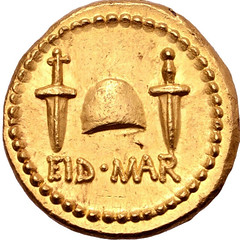 A rare and ancient gold coin that morbidly celebrates the stabbing death of Julius Caesar was returned this week to Greek officials by investigators in New York who had determined it was looted and fraudulently put up for sale at auction in 2020.
A rare and ancient gold coin that morbidly celebrates the stabbing death of Julius Caesar was returned this week to Greek officials by investigators in New York who had determined it was looted and fraudulently put up for sale at auction in 2020.
The coin, known as the Eid Mar
and valued at $4.2 million, features the face of Marcus Junius Brutus, the onetime friend and ally of Caesar who, along with other Roman senators, murdered him on the Ides of March in 44 B.C. According to historians and experts, Brutus had the coins minted in gold and silver to applaud Caesar's downfall and to pay his soldiers during the civil war that followed the killing.
DISCOVERING THE 1870-S HALF DIME
In his column The Curious Collector for the March 2023 E-Gobrecht from the Liberty Seated Collectors Club, Len Augsburger looked into the discovery of the unique 1870-S Half Dime. -Editor
The 1870-S half dime is well-known as one of the few unique coins in the U.S. series and is a relatively modern entry into this exclusive club, being discovered only in the late 20th century. Heritage Auctions recently sold the piece as part of the Tom Bender collection, at the 2023 FUN sale, where it was graded PCGS MS64 CAC and realized $3.12 million.
The discovery story of the coin was not well publicized until Bill Burd, a longtime Chicago dealer, wrote in the June 1998 Numismatist:
GEORGE WASHINGTON ON EARLY PAPER MONEY
A Stack's Bowers blog article by Chris Bulfinch discusses one of the first appearances of George Washington's likeness on paper money. He mentions the book by Heinz Tschachler that we discussed in 2020. I added an image and link to our earlier article. -Editor
George Washington's aversion his likeness appearing on federally-issued coinage is well-remembered. Resisting the monarchical overtones of such appearances, United States coinage initially featured an allegorical bust of Liberty, establishing a precedent of not including any chief executives on coinage which would persist for decades after 1792.
While the Constitution gave the right to coin money to the federal government (and denied it to the states), private banks were free to feature whatever motifs they wished on their notes. The first bank to disregard Washington's sensibility was, somewhat ironically, the Washington Bank in Westerly, Rhode Island. In 1800, less than a year after Washington's passing, the bank issued notes bearing his portrait. These notes are thought by obsolete paper money experts to be the first banknotes issued after the Revolution and Washington's death that featured the nation's first Commander-in-Chief.
CONFEDERATE CURRENCY COUNTERFEITER CAUGHT
A man was arrested in Missouri for allegedly selling counterfeit Confederate States of America notes. Thanks to Doug Davis of the Numismatic Crime Information Center for the notifications and links. -Editor
A Carthage man who is accused of counterfeiting and fraud by several people in various states across the U.S., has now been arrested and charged.
Carthage Police Chief, Bill Hawkins confirmed that Jeremy J. Tewell, 44, of Carthage was arrested Thursday (3/23) and is charged with forgery and felony stealing. Chief Hawkins said a person from the Carthage area contacted the police department, stating they too had purchased a counterfeit Confederate States of America bank note. Hawkins says the note was confirmed to be counterfeit by an unknown third party who specializes in civil war era currency.
It's not unusual to work a crime of forgery or various types of fraud, but this one is — in the fact that it deals with various types of currency, and it deals with multi-state victims. So, just trying to coordinate this into just one big case, it's challenging,
said Chief Hawkins.
THE BOOK BAZARRE
THE TWO DOLLAR BILL DOCUMENTARY
Pablo Hoffman writes:
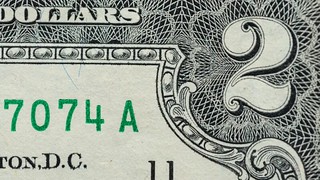 "Here's a so-so general readership article on the 2-Dollar bill. It contains a link to an absolutely terrific documentary all about the deuce note that is very worth watching, fascinating throughout its hour-and-forty-minute length. It let me in on some facts I never knew before, even after 65 years in the business of paper money.
"Here's a so-so general readership article on the 2-Dollar bill. It contains a link to an absolutely terrific documentary all about the deuce note that is very worth watching, fascinating throughout its hour-and-forty-minute length. It let me in on some facts I never knew before, even after 65 years in the business of paper money. Myrta's story,
near the end, should not be missed!"
This is the documentary produced by filmmaker John Bennardo. If you missed it earlier, give it a shot now. It's also a great way to introduce friends to the hobby. Earlier articles about it are linked below. -Editor
ZIMBABWE'S LATEST SMALL CHANGE PANIC
Zimbabwe's money situation is a debacle that just keeps debacling - a permanent economic dumpster fire. We've been writing about this for over a decade, and here we are with another story (this time from the Wall Street Journal) about the country's dismal economy. Great headline: "The Country Behind the $100,000,000,000,000 Bill Hits a New Stage of Dysfunction."
As mentioned earlier, the current situation is an exact mirror of the Small Change Panic that swept the United States during the Civil War. Without a proper government-provided means of exchange, businesses and citizens make do, improvising substitutes in order to keep markets functioning. -Editor
LOOSE CHANGE: MARCH 26, 2023
Here are some additional items in the media this week that may be of interest. -Editor
For the first time as a monarch, King Charles III will travel to York to hand out Maundy money in the ancient ritual. -Editor
Charles and the Queen Consort will attend the Royal Maundy Service in York Minister on April 6.
During the Maundy Thursday event, the King will present 74 men and 74 women with specially-minted silver coins to the value of 74p – signifying Charles's age – to thank the pensioners for their service in local communities.
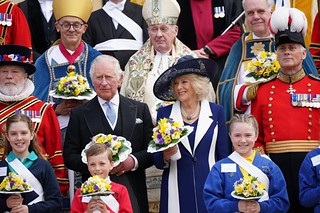 Last year, Charles, as the Prince of Wales, stepped in to carry out the custom for the first time, acting on the late Queen's behalf after she experienced mobility problems and could not attend.
Last year, Charles, as the Prince of Wales, stepped in to carry out the custom for the first time, acting on the late Queen's behalf after she experienced mobility problems and could not attend.
He handed out coins to the value of 96p – to represent his mother's age – in St George's Chapel, Windsor Castle.
This year will be the first Maundy service since the death of Elizabeth II in September and the start of the Carolean age.
To read the complete article, see:
King to visit York to distribute Maundy money for first time as monarch
(https://www.bracknellnews.co.uk/news/national/23408449.king-visit-york-distribute-maundy-money-first-time-monarch/)
Other topics this week include
the National Emergency Library
,
-Editor

